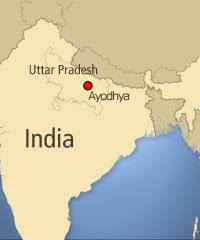 Ayodhya, India
Ayodhya, IndiaAn Indian court has decided the fate of plot of land that is the center of a long simmering conflict in Ayodhya, India, a city of just 49,000 or so, up north towards Nepal. The site is small but holy to Hindus, as it is considered the birth place of Hindu god Sri Rama.
 The city is located along a river
The city is located along a riverHindus want to build a temple there. Unfortunately, over the past 400 or so years, there was a mosque sitting on the site, though built only after an earlier temple had been demolished on the orders of Mughal emperor Babur in 1528. Since 1949, 18 judges have heard court cases regarding the legitimacy of not only the demolition of the original temple, but whether the Mosque had been built according to Islamic law, etc, etc.
In 1992, Hindu activists tore down the Mosque, which resulted in extreme violence with over 2000 people killed. A tent was then erected over a small portion of the site which is supposed to be the exact birthplace of Rama, and the whole acreage in question has been heavily guarded ever since.
The new ruling gives Hindus control over most of the site including their tent location, but must share a portion of the overall site with Muslims, as well as a smaller portion awarded to another sect altogether. The Indian Prime Minister appealed for calm and a respect for other's religions. The head of one Hindu group involved in the court case and responsible for the tent, Mohan Bhagwat, said: "It is no-one's victory, no-one's defeat. The temple for Lord Ram should be built; now everyone should work unitedly to ensure that the temple is built at the site." Nearly 200,000 security personnel were deployed across northern India to quell any unrest in the wake of the verdict.
 The site contains half demolished buildings, a makeshift tent, and a lot of passionate believers.
The site contains half demolished buildings, a makeshift tent, and a lot of passionate believers.Is this relevant or not to larger world issues? Certainly the earlier deaths of 2000 people make it a potential flashpoint again. Perhaps we can say that religious identities and loyalties so often succumb to a much larger "god" of violence, regardless of what each religion's tenets espouse. We can hope the plea from these Indian Schoolgirls seen below will prevail.


No comments:
Post a Comment